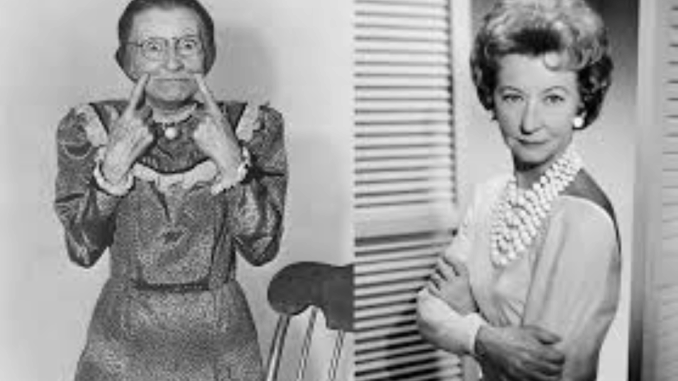
Irene Ryan remains one of the most cherished figures in American television history, forever remembered for her unforgettable portrayal of Daisy May Moses—better known as Granny—in the beloved sitcom The Beverly Hillbillies (1962–1971). For nearly a decade, she brought to life the spunky, sharp-tongued, and quick-witted grandmother who became a household favorite across the United States. With her fiery temper, country wisdom, and impeccable comedic timing, Ryan made Granny more than just a supporting character; she turned her into a cultural icon.
The Beverly Hillbillies was a phenomenon of its time, consistently ranking among the top-rated shows of the 1960s. Irene Ryan’s performance stood out as one of the strongest elements of the series, helping the show resonate with audiences far beyond its initial run. Critics and fans alike praised Ryan for her ability to combine slapstick humor with heartfelt warmth, making Granny both hilarious and endearing. Her work on the show firmly established her as a versatile actress capable of commanding the screen, no matter the scene.
But Irene Ryan’s career did not begin or end with television. Long before she stepped into Granny’s shoes, Ryan had built a reputation in vaudeville, radio, and film, showcasing her adaptability as an entertainer. She had a natural gift for comedy and performance that carried her across different media throughout her life. Even after the tremendous success of The Beverly Hillbillies, she was not content to rest on her laurels. Instead, she pursued new challenges on the stage, eager to prove her range to audiences in another medium.
In 1972, Ryan took on the role of Berthe, the eccentric grandmother of the title character in the Broadway musical Pippin. The role was a striking contrast to Granny, yet she delivered it with such charm and energy that she once again captured the hearts of audiences. Her performance in Pippin earned her a nomination for the Tony Award for Best Featured Actress in a Musical, highlighting her ability to reinvent herself and excel even outside the world of television. For Ryan, the role was not just another job; it was proof of her lifelong dedication to the performing arts and her unwillingness to be confined to one type of role.
Tragically, her time on the stage was cut short. In March 1973, during a performance of Pippin, Ryan collapsed after suffering a stroke while singing on stage. Though she was rushed to the hospital, her condition deteriorated, and she passed away just six weeks later at the age of 70. Her death was a devastating blow to the entertainment world, but it also underscored the depth of her commitment to her craft—she was performing until her very last days.
Today, Irene Ryan’s legacy lives on. To millions, she will always be Granny, the fiery matriarch who could outwit anyone. To theatergoers, she is remembered as Berthe, a role that brought her acclaim late in life. And to her peers, she was an artist who devoted every ounce of her energy to making people laugh, smile, and feel connected. Irene Ryan’s life reminds us that true dedication to art does not end until the final curtain falls.